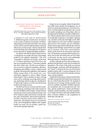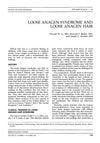Search
for
Sort by
Research
120-150 / 1000+ results
research A Clinico-Epidemiological Study of Scalp Hair Loss in Children (0–18 Years) in Kota Region, South-East Rajasthan
About 12% of children in Kota, Rajasthan, experience hair loss, mainly due to fungal infections, with early treatment advised to prevent worsening.
research Ceramic Flat Irons: Improper Use Leading to Acquired Trichorrhexis Nodosa
Improper use of ceramic flat irons can cause severe hair damage.

research A Hairy Situation: PADIs in Regeneration and Alopecia
Enzymes called PADIs play a key role in hair growth and loss.

research Factors Associated With Traction Alopecia in Women Living in Yaoundé, Cameroon
Older age and specific haircare practices increase the risk of traction alopecia, and education on these factors could help prevent it.

research A Woman with Focal Alopecia
A 65-year-old woman has a growing bald spot on her scalp.

research Cutaneous Manifestations of Eating Disorders
Skin problems are common and important signs of eating disorders and treating the eating disorder can improve these skin conditions.

research Cutaneous Manifestations of Eating Disorders
Eating disorders can cause skin problems that need treating the underlying condition for better health.

research Book Review: Pediatric Hospital Medicine: Textbook of Inpatient Management
The book is a useful resource for healthcare providers working with hospitalized children but misses some important studies and detailed problem evaluations.

research The Biology of Hair Care
Better hair care products are needed to protect against grooming and chemical damage.
research Gsdma3 Is Required for Hair Follicle Differentiation in Mice
The Gsdma3 gene is essential for normal hair development in mice.

research Exogenous Factors in Hair Disorders
Outside factors like grooming, chemicals, and the environment can damage hair and cause disorders.

research Mutant Laboratory Mice With Abnormalities in Hair Follicle Morphogenesis, Cycling, and Structure: Annotated Tables
Mutant mice help researchers understand hair growth and related genetic factors.

research Msx2 Supports Epidermal Competency During Wound-Induced Hair Follicle Neogenesis
The gene Msx2 is crucial for hair follicle regeneration during wound healing.

research Deletion of the Developmentally Essential Gene ATR in Adult Mice Leads to Age-Related Phenotypes and Stem Cell Loss
Removing the ATR gene in adult mice causes rapid aging and stem cell loss.

research Intragenic Deletion in the Desmoglein 4 Gene Underlies the Skin Phenotype in the Iffa Credo Hairless Rat
A gene deletion causes the "hairless" trait in Iffa Credo rats.
research Notch Signaling Regulates Late-Stage Epidermal Differentiation and Maintains Postnatal Hair Cycle Homeostasis
Notch signaling is essential for healthy skin and hair follicle maintenance.

research Modeling of Solar UV-Induced Photodamage on the Hair Follicles in Human Skin Organoids
Sunlight exposure damages hair follicles, but certain stem cell-derived particles can reduce this damage and help with hair regeneration.

research Therapeutic Potential of Stem Cells in Follicle Regeneration
Stem cells, especially from fat tissue and Wharton's jelly, can potentially regenerate hair follicles and treat hair loss, but more research is needed to perfect the treatment.

research The Lysosomal Protease Cathepsin L Is an Important Regulator of Keratinocyte and Melanocyte Differentiation During Hair Follicle Morphogenesis and Cycling
Cathepsin L is essential for normal hair growth and development.

research Suppression of Wnt/β-Catenin Signaling by EGF Receptor Is Required for Hair Follicle Development
Blocking Wnt/β-catenin signaling with EGF receptor is necessary for proper hair growth.

research The Critical Roles of Serum/Glucocorticoid-Regulated Kinase 3 (SGK3) in Hair Follicle Morphogenesis and Homeostasis
SGK3 is essential for proper hair growth and health.

research Loose Anagen Syndrome And Loose Anagen Hair
Loose Anagen Syndrome causes easy-to-pull, thin hair, mainly in young girls, and improves with age.
research Plica Neuropathica: Bird's Nest Under Dermatoscope
Plica neuropathica is a tangled hair condition that may be caused by hair damage or psychiatric issues and is treated by cutting the hair and addressing mental health.

research Towards a Molecular Understanding of Hair Loss and Its Treatment
Future hair loss treatments should aim to extend hair growth, reactivate resting follicles, reverse shrinkage, and possibly create new follicles, with gene therapy showing promise.

research Therapeutic Strategies for Treating Hair Loss
The conclusion is that we need more effective hair loss treatments than the current ones, and these could include new drugs, gene and stem cell therapy, hormones, and scalp cooling, but they all need thorough safety testing.

research Nonscarring Diffuse Hair Loss in Women: A Clinico-Etiological Study from a Tertiary Care Center in North-West India
Most women in the study lost hair due to chronic shedding, with stress and nutrient deficiencies being common factors.

research Mucocutaneous Reactions to Chemotherapy
Chemotherapy can cause various skin reactions, with hair loss being the most common, and proper diagnosis and treatment of these reactions are important.

research Alopecia Areata in a Rhesus Monkey (Macaca Mulatta)
The monkey's hair loss was due to an autoimmune disease, not genetics.

research A Rare Case of Azathioprine Induced Anagen Effluvium and Plica Neuropathica
Azathioprine can cause hair loss and matted hair.